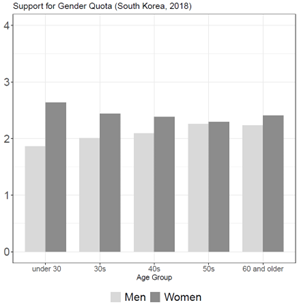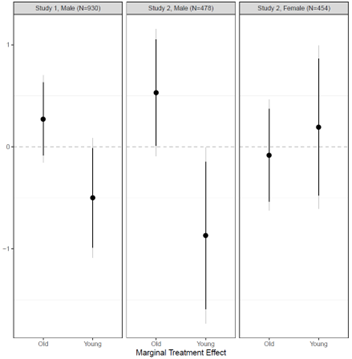
Explaining Young Men’s Opposition to Gender Equality Policies in South Korea
June 1, 2023
R-2023-017
Recent surveys in South Korea show that resistance to the institutionalization of gender equality is stronger among younger than older men. This, the author argues, indicates not a turn toward conservative values but an increasing sense of insecurity from slower economic growth.
* * *
While it is widely believed that younger generations are more supportive of equality and diversity than older generations (Norris and Inglehart 2003; Nteta and Greenlee 2013), recent polls in South Korea reveal that young men in their twenties and thirties oppose gender equality policies more strongly than older men (Jeong and Lee 2019). Interestingly, this is not a phenomenon unique to South Korea. As shown in Figure 1, support for a legislative gender quota is higher for younger groups among women. For men, however, the younger they are, the stronger is their opposition to a gender quota. Studies of other countries also show that young men in their twenties and thirties oppose gender equality policies or female political leadership at a rate similar to, if not higher than, older men (Burden et al. 2017; Ono and Burden 2019).
Figure 1. Gender Quota Support by Gender and Age Groups

Source: Hankook Research (2018).
Previous research has emphasized conservative gender norms and stereotypes as determinants of public opposition to gender equality policies (Barnes and Cόrdova 2016; Keenan and McElroy 2017; Beauregard 2018; Smith et al. 2017). However, conservative norms and stereotypes do not explain the hostility of young men towards such policies, as they tend to hold more liberal norms than older counterparts (Kim and Kweon 2022). Then what explains young men’s opposition to gender equality policies in South Korea?
In my article, “Why Do Young Men Oppose Gender Quotas? Group Threat and Backlash to Legislative Gender Quotas,” coauthored with Jeong Hyun Kim, we show that young men’s opposition to gender equality policies should be understood by their group-based anxiety caused by perceived threats to their status (Kim and Kweon 2022). The growing presence of women in social, economic, and political arenas has heightened anxiety among men who view women’s achievement as a threat to their social status. Such anxiety, in turn, results in increased opposition to policies that aim to further enhance women’s status in society.
Our study emphasizes that young men in their twenties and thirties are particularly sensitive to status threat. There are two main reasons for stronger hostility toward gender equality policies among younger men. First, the economic conditions faced by younger generations today are much bleaker than when older generations were young. With slower economic growth in the post-industrialization era, material wealth and benefits in such forms as job security and home ownership—which were enjoyed by older generations—are increasingly out of reach for the younger generation. Instead, the younger generation today suffer from high youth unemployment rates, job insecurity, and limited access to home ownership, although they are more educated than their elders. Such macroeconomic realities reinforce the younger group’s economic vulnerability, resulting in their low support for policies that promote gender equality, which are perceived as a threat to their status.
Second, younger individuals are still at the early stage of their careers, with many having recently graduated from university and started their first job. Unlike those in their forties and above, these young people are not yet on a firm economic footing. This is likely another reason why young men are more susceptible to perceived status threat than their older counterparts.
In our study, we conducted two survey experiments to examine whether younger men are more reactive to status threat and whether perceived status threat would lead to lower support for gender equality policies. To measure attitudes toward gender equality policies, we focus on three policies: legislative gender quotas, equal pay, and corporate gender quotas. As presented in Figure 2, exposure to status threat lowered young men’s support for a legislative gender quota. However, status threat did not have much impact on men aged 40 or above and on women in all age groups. This demonstrates that young men are more susceptible to status threat than any other demographic groups. Similar results were found regarding support for equal pay and corporate gender quotas.
Figure 2. Marginal Effects of Status Threat Treatment

Source: Figure 3 in Kim and Kweon 2022.
In the survey, we further asked those who opposed gender equality policies to give their rationale for their opposition. Interestingly, men in the twenties and thirties provided reasons that differed from older respondents. For older men, the main reason was rooted in their gendered belief that women were not qualified for political leadership. They were mostly concerned that the quota would decrease the quality of politicians; they believed that men and women had different qualifications and that women were not suitable for leadership. These responses reveal that conservative gender norms and gendered stereotypes drive their opposition to gender equality policies.
By contrast, men in their twenties and thirties did not make any reference to gender norms or stereotypes. Instead, their responses were mainly centered around their concerns about the negative effects that the policy might have on their social status. Many respondents expressed such concerns by referencing the term “reverse discrimination.” They were troubled by the possibility that a gender quota could further diminish men’s status, which they perceived to be already dwindling. Such concern was stronger among young men, who were exposed to status threat.
Our study carries important policy implications. Governments around the world have made various efforts to increase social and political diversity and promote women’s advancement. However, previous studies reveal that gender equality policies could invite backlash when they are implemented without public support (Clayton 2015; Kerevel and Atkeson 2017). On this note, the findings of our study suggest that liberal gender norms and stereotypes are not sufficient to improve public support for policies aimed at increasing diversity and gender equality and that economic conditions have gendered consequences.
References
Barnes, Tiffany D., and Abby Cόrdova. 2016. “Making Space for Women: Explaining Citizen Support for Legislative Gender Quotas in Latin America.” Journal of Politics 78: 670–86.
Beauregard, Katrine. 2018. “Partisanship and the Gender Gap: Support for Gender Quotas in Australia.” Australian Journal of Political Science 53: 290–319.
Burden, Barry C., Yoshikuni Ono and Masahiro Yamada. 2017. “Reassessing Public Support for a Female President.” Journal of Politics 79: 1073–78.
Clayton, Amanda. 2015. “Women’s Political Engagement under Quota-Mandated Female Representation: Evidence from a Randomized Policy Experiment.” Comparative Political Studies 48: 333–69.
Jeong, Hanwool, and Jeong-Jin Lee. 2019. Perceptions of Women’s Political Participation. Technical Report. Seoul: Hankook Research.
Kerevel, Yann P., and Lonna Rae Atkeson. 2017. “Campaigns, Descriptive Representation, Quotas and Women’s Political Engagement in Mexico.” Politics, Groups and Identities 5: 454–77.
Kim, Jeong Hyun, and Yesola Kweon. 2022. “Why Do Young Men Oppose Gender Quotas? Group Threat and Backlash to Legislative Gender Quotas.” Legislative Studies Quarterly 47(4): 991–1021.
Ono, Yoshikuni, and Barry C. Burden. 2019. “The Contingent Effects of Candidate Sex on Voter Choice.” Political Behavior 41: 584–607.
Norris, Pippa, and Ronald Inglehart. 2003. Rising Tide: Gender Equality and Cultural Change around the World. New York: Cambridge University Press.
Nteta, Tatishe M., and Jill S. Greenlee. 2013. “A Change Is Gonna Come: Generational Membership and White Racial Attitudes in the 21st Century.” Political Psychology 34: 877–97.
Smith, Amy Erica, Katherine Warming, and Valerie M. Hennings. 2017. “Refusing to Know a Woman's Place: The Causes and Consequences of Rejecting Stereotypes of Women Politicians in the Americas.” Politics, Groups, and Identities 5: 132–51.
